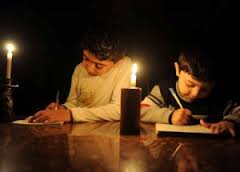Gunship diplomacy, rockets and the forgotten tragedy of Gaza
By Khaled Diab
The other tragedies make it is easy to forget Gaza. But with a humanitarian crisis and rising tensions, it's time to end the Israeli-Egyptian blockade.
Saturday 15 March 2014

These days it seems that Gaza only makes it on to the mainstream Western media's radar when it involves rocket attacks or just simply rockets.
This was amply demonstrated this week, when the media took a brief break from Syria and the Ukraine to train their lens on the besieged Palestinian enclave.
On Wednesday, Gazan militants fired a barrage of rockets into southern Israel, causing no casualties. Islamic Jihad, which claimed responsibility for the attack, said it was in retaliation for an Israeli airstrike which killed three of its members a day earlier.
On Monday, Israel displayed an arms shipment it had intercepted which it said was Iranian and destined for Gaza.
Though this is not beyond the bounds of possibility, given Iran's history of supporting Hamas, I find the claim unlikely, and that the arms were probably heading elsewhere. Firstly, relations between Iran and Hamas suffered a serious rift two years ago when Gaza's leadership opposed Bashar al-Assad's violent suppression of the popular uprising against his regime, and efforts to mend fences have yet to deliver substantial results.
Tehran's subsequent withdrawal of its financial support to the embattled Hamas government has caused enormous economic hardship for the Gazan population, over and above what it endures due to the Israeli-Egyptian blockade. This is reflected in the 75% budget deficit Hamas announced for 2014, the regular 16-hour blackouts and the severe shortages Gazans must suffer.
Of course, it is possible that the arms were destined for one of Hamas's more radical rivals, namely Islamic Jihad. However, the Israeli claim regarding the arms shipment also makes very little logistical sense.
The ship was intercepted in the Red Sea and IDF officials say that the arms were to be routed to Gaza overland via Sudan. This is a very risky and foolhardy proposition, and would almost certainly have guaranteed that the shipment was intercepted before it reached its final destination.
Port Sudan is over 1,300km away from Gaza and the huge expanse of mainland Egypt, which is hostile to Hamas, lies in-between. Any arms smuggler worth his or her salt would have docked somewhere in the increasingly lawless Sinai, where Islamist militants holed up there could've provided logistical support to get the weapons into Gaza – if that, indeed, was where they were bound.
Moreover, if Iran's aim was to strike Israel, why bother with Gaza, whose border with Egypt has become more and more tightly sealed in recent months in the new regime's bid to suffocate Hamas?
Israel identified the weapons onboard the seized vessel as being Syrian. Surely, it would have been much easier for Tehran to ask its ally in Damascus to fire these weapons into Israel across the Syrian border. If the attack was then blamed on Jihadist fighters, Iran would be able both to attack Israel by proxy while aiding its ally, Bashar al-Assad, in discrediting his enemies.
All this makes the Israeli claim that the shipment was destined for Gaza seem outlandish. So what is behind Israel's insistence?
Part of the reason might relate to the atmosphere of public fear surrounding Iran in Israel, which does not invite a rational consideration of the evidence and facts.
For Israel's leaders, political expediency seems to be a major factor. In his speech in Eilat, where the arms cache was presented to the international media, Binyamin Netanyahu sought to kill two birds with one stone.
First, he strove to stymie the growing rapprochement between Tehran and the West. “Just as Iran tried to camouflage this deadly weapons shipment, Iran camouflages its military nuclear programme,” the Israeli premier said, blasting Western leaders for their “hypocrisy” when “smilingly shaking hands” with Iranian leaders.
Second, the Israeli establishment used the arms shipment as an opportunity to fan the flames of distrust towards Hamas in Gaza, and the Palestinians in general, partly to enrage and frighten a fearful domestic audience. “Each one of these rockets poses a threat to the safety of the citizens of Israel, each bullet and each rocket that was discovered had an Israeli address,” Lieutenant General Benny Gantz has been quoted as saying.
This reflects Netanyahu's own discourse on and attitude towards peace talks, which US Secretary of State John Kerry has been pushing actively through continuous shuttle diplomacy. If Israel signs a deal with the Palestinians “that peace will most certainly come under attack – constant attack by Hizbullah, Hamas, al-Qaeda and others,” the prime minister told the recent AIPAC annual conference.
And it isn't just Kerry's peace overtures that Netanyahu is resisting. Despite Washington's own lethargy towards the humanitarian disaster zone that is Gaza, there is mounting international pressure to ease, or even lift, the blockade on the territory. Even the European Union is losing patience.
In a report released this week, the EU's heads of mission called for a “strategy for a political endgame resulting in Gaza's return to normality”, naming Israel as “the primary duty bearer” due to its role as the occupying power, while urging Hamas to instate a “categorical renunciation of violence”.
But this is likely to fall on deaf ears in Israel, where public anger is simmering, blinding people to the true causes behind this dire situation.
It has long been my view that both principle and pragmatism demand an end to the Israeli-Egyptian siege of Gaza. It is the principled thing to do because collectively and severely punishing 1.7 million civilians is inhumane.
Pragmatic because such punishment is counterproductive. Although Gaza'stroubles pale in comparison with Syria's, the humanitarian consequences of the Israeli-Egyptian blockade have been building up over the years and continue to exact a heavy toll. Moreover, this has aroused little public protest in Israel, while the Egyptian public has gone from anger at the Mubarak regime's complicity in the siege to cheering Egypt's de facto leader Abdel-Fattah al-Sisi as he raises the few drawbridges providing relief to this hostage population.
In Gaza, official unemployment runs at about a third of the population, with the actual figure probably significantly higher, and almost a million of the Strip's 1.7 million residents are expected to require food aid this year. Gaza also endures severe fuel shortages, endless blackouts, while raw sewage and seawater contaminate the water supply.
Although Israel has the right and duty to ensure the security of its citizens, Israel's policy has failed to achieve any of its stated aims, and may even be radicalising a new generation of young Gazans who have seen nothing of Israel except its heavy boot. Egypt's complicity in hurting a population only recently regarded as “Arab brothers” makes even less sense.
Besides, if it is a ceasefire that Israel is after, Hamas has respected the one brokered following the conflict of 2012.
This might suggest that Israel's objectives go beyond stopping the rocket attacks and extend to destroying Hamas. But this is unlikely to work, as efforts to dislodge the Islamist movement — including major military operations since Hamas came to power, in 2006, 2008/9 and 2012 — have only strengthened its grip on power.
In addition, Israel has imposed severe restrictions on Gazans since at least 1991, when it began its permanent closure policy in the Strip, with little noticeable effect on Israel's security or prospects for peace.
In short, principle and pragmatism demand that both Israel and Egypt lift their inhuman and insane siege of Gaza.
—
Follow Khaled Diab on Twitter.


